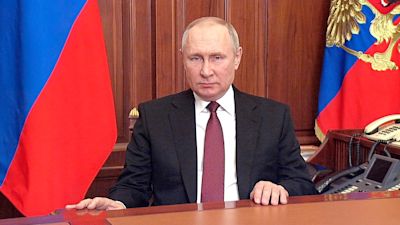Peston: How Putin has killed globalisation and what that means for us

Putin's savage invasion of Ukraine, and the West's collective response, is the moment that the slow death of financial and trade globalisation has been accelerated and made irreversible.
Globalisation has been rolled back since the banking crisis of 2008, first by the banking regulation that followed, then by Trumpian and Brexit nationalism and mercantilism, then by Covid and now by the shock of war.
The current dislocation of supply chains, especially for energy but much more broadly, means inflation will be much higher for longer - because businesses will speed up the shift in procurement of raw materials, energy, components and so on to supplies much closer to home.
It is not unrealistic to fear inflation will be nudging 10% for a couple of years, maybe longer.
And the undermining of the property rights of oligarchs, banks and businesses through the imposition of sanctions is the definitive end of that flood of cash and liquidity that coursed through London especially - and other cities - as the super-rich placed their wealth (ill-gotten or not) in what they perceived as the safest haven.
We will see the emergence of competing financial systems - a Western one, a China-centric one, a crypto one - with pools of liquidity that are smaller and shallower. The cost of money will rise, for years and maybe decades.
But to be clear, these irreversible trends may not ultimately be a bad thing, especially for the millions of people who were dispossessed by globalisation in de-industrialising regions throughout the rich West.
The point about globalisation is it accelerated global growth, and boosted the living standards of hundreds of millions of people in developing countries, especially China and India. It narrowed income gaps between countries, between - as the paradigm - China and America.
But it widened income gaps within countries, notoriously between the rust belts of the UK, Europe and America on the one hand, and the great cosmopolitan metropolises on the other.
The reason "levelling up" is Boris Johnson's big slogan is that the income and wealth gaps within the UK, regional and within regions, widened to undermine national cohesion, to perniciously dismantle British common purpose.
So if globalisation has now been put into accelerated reverse - and arguably it has - then economies like the UK's will be reconstructed so that much more manufacturing and food production will be carried out closer to home or at home.
And that brings the prospect of better rewarded jobs for British people, though not - of course - till they acquire the requisite skills.
Which means that for months and even years, during the economic adjustment, the prices of goods and labour will rise at rates we haven't seen for decades.
It's too early to be confident about all the consequences for how we live. But we can be confident that these changes will be more significant and longer lasting than the impact of Covid-19.
One set of institutions, the central banks - the Bank of England, the US Federal Reserve, and the European Central Bank - face an especially acute dilemma.
If inflation is the result of a structural reconfiguration of economies - a re-nationalisation of economies - then putting up interest rates, as they would normally do to fight inflation, would be slowing down and making more painful that inevitable reconfiguration.
But if they suspend - even temporarily - their normal inflation targets, there's a risk that higher inflation will become endemic in these reconfigured economies.
This is a really tough call for the central bank governors and their political masters.
They won't be thanked, however, for putting up interest rates during what will be the worst cost of living squeeze for everybody in living memory - and the reputations of their important institutions will suffer if they are seen to be imposing misery that delays benign industrial change. Forgive me for talking about money and our living standards when the people of Ukraine face acute and immediate tragedy. But unless we recognise the magnitude of the shock this crisis has caused to us, we'll be less able to challenge the current tyrant, his imitators and successors.
This is history. And when we look back on these tumultuous times, we may decide that the definitive moment globalisation died was when China, India and South Africa all abstained on the United Nations Vote condemning Putin's invasion.
If they are so alienated from the global rules and norms that have delivered rising prosperity to them in recent decades, we have to look much more to ourselves for our economic security.
Is Russia committing war crimes in Ukraine? Listen to our What You Need To Know podcast